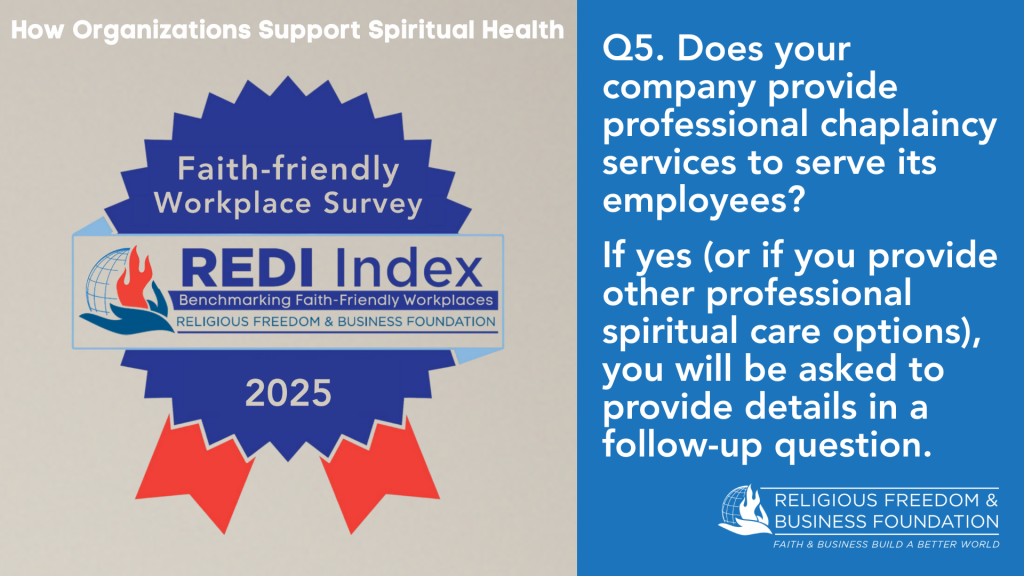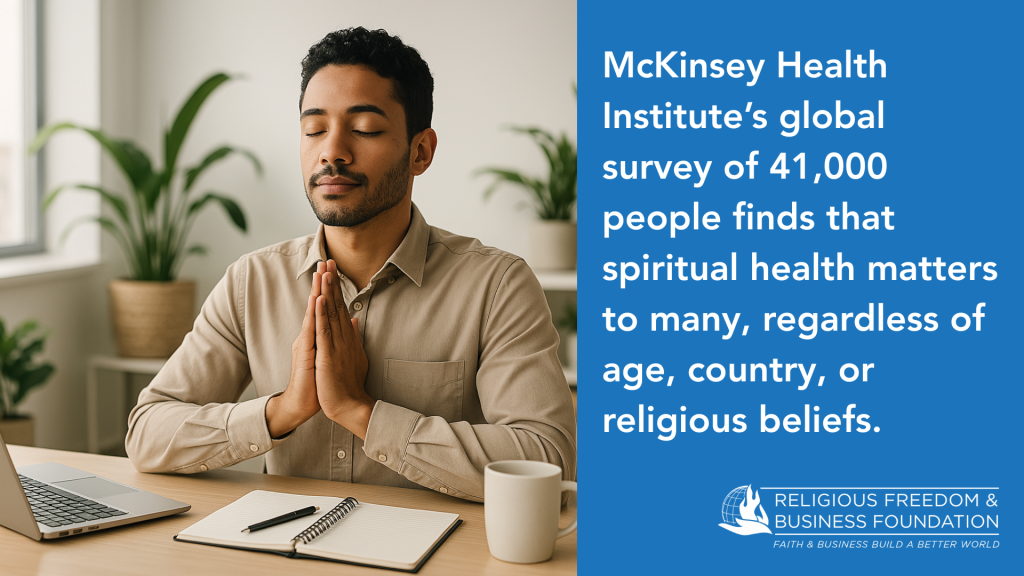McKinsey & Co.’s Health Institute’s global survey of 41,000 people finds that spiritual health matters to many, regardless of age, country, or religious beliefs.
Spiritual health refers to a sense of purpose, inner peace, and alignment with personal and organizational values. When nurtured, it can enhance employee well-being, foster a more compassionate culture, and improve overall engagement and productivity. It’s not about religion, per se, but about creating space for meaning, connection, and ethical integrity in daily work life.

This is not a small problem affecting just a few. A recent Harvard study found that nearly 3 in 5 young adults (58%) report lacking “meaning or purpose” in their lives. The Religious Freedom & Business Foundation’s Faith-Friendly Workplace ‘REDI’ Index includes providing for spiritual health as one of the best practices for workplaces to benchmark.

One way that organizations support spiritual health in by providing chaplains, having faith-and-belief employee affinity or resource groups, and/or offering faith-related services – such as counseling – through their Employee assistance Programs. Last week, Diane Brady, who publishes the Fortune CEO Daily newsletter, included an intriguing quote by Penny Pennington, head of the investment advice firm Edward Jones, saying, “We’re a health and wellbeing company.” I dropped Diane a note about the rising attention of companies to Spiritual Health, and mentioned Tyson Foods’ Chaplaincy Program, which provides compassionate multi-faith chaplaincy services at all their major plants. She’s following up to see if she can interview John Tyson about this for a future newsletter.

Another way is by offering mindfulness and/or meditation programs. A 2022 research article in the Harvard Business Review estimated that More than half of American employers offer some form of mindfulness training to their workers, contributing to a global corporate wellness market that’s valued at over $50 billion. The article offers strategies to help employers and employees implement the targeted mindfulness programs that will be most beneficial for everyone.

Spiritual health is also supported by having a purpose-driven work culture. Next month, I’ve been invited to Walmart Headquarters to speak at their Faith Network Associate Resource Group’s August event titled “Live our Values”. I’ve been asked to speak about how faith connects to Walmart’s Core Values and explore with them meaningful ways that associates can show up to work each day to live out their faith and embody the Walmart values of “Respect for the Individual”, “Acting with Integrity”, and “Striving for Excellence”. This is something every organization could do – open the space for their members to reflect on how their own faiths and beliefs animate how they lean into their organization’s values.

There are other ways that organizations can support spiritual health, but the last that I’ll mention is to provide Inclusive Spaces for Reflection and Dialogue. Of course, such rooms shave proliferated as a best practice across the corporate world. Last week, I had a meeting with the Director of the Faith-Based Office at the US Department of Labor. He heard about today’s session and wanted to explore ways they might reinforce this message. I’m looking forward to what comes from that meeting, but one thing we talked about was the multi-faith meditation room on the fourth floor of the Department of Labor. One his first thoughts was to reinvigorate that space, including making it more like an interfaith chapel or perhaps like the meditation room in the picture.
I’d like to invite you to join the UK Faith@Work Network next month on 14th August to hear from Dr Amanda Murjan, the author of the just-released survey and research report from the Institute for the Impact of Faith in Life (IIFL), on how faith offers a powerful counterpoint as the UK and UK workplaces grapple with rising levels of loneliness, anxiety and mental distress: registration link.
It’s now my pleasure to introduce my friend and seasoned mental and spiritual health practitioner Patrick Regan, awarded Order of the British Empire by the Late Queen Elizabeth II.
Patrick is an Honorary Fellow at the London South Bank University for his contribution towards justice and well-being. Patrick has written several books, the latest one being Brighter days, 12 steps to wellbeing.



